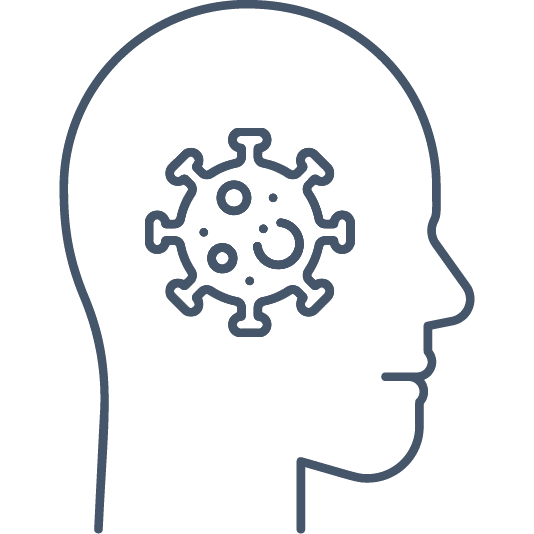Long Covid
What we can improve
The main neurological complications of long Covid are headaches, insomnia, cognitive difficulties, paresthesia*, depression, anxiety, dizziness, epileptic seizures and mood changes. If you suffer from one or more of these symptoms, we are happy to announce that neurofeedback can help you, and that several clinical studies have observed this effectiveness (Orendácová, M. and Kvašnák, E., 2022).
*: Paresthesia is a sensitivity disorder resembling a sensation of tingling and numbness, generally felt in the hands, feet or legs.
Covid symptoms have several intertwined causes which vary depending on the person. The coronavirus stimulates a strong immune response that creates inflammation in the body and brain. When this response is excessive, severe neuronal damage can result. In addition, the virus itself can penetrate the brain and cause various damages.
When neurons or microglia are damaged, their functioning is affected. The more pronounced the malfunction, the greater the probability of a self-destruct message. This results in various symptoms that vary depending on the specific regions of the brain that are affected.
Given that each person is affected differently, the first step in neurofeedback is to measure the effectiveness of different regions of the individual’s brain. This makes it possible to determine what electrical brain circuits are affected and cause the symptoms of long Covid.
After the assessment, neurofeedback training will be personalized to restore the effectiveness of dysfunctional brain regions. For example, they will target the frontal attention circuit, the anxiety circuit, mood circuit, pain circuit, or others depending on the situation and objectives.
Now, clinical studies measuring the effects of neurofeedback on symptoms of long Covid have demonstrated:
- Increased cognitive abilities such as attention and memory
- Reduced level of stress and anxiety
- Reduced pain associated with headaches
- Improved mood and reduction of depressive symptoms
- Improved sleep quality and recovery
- Improved quality of life
For more information, request your FREE telephone consultation.
Le trouble du déficit de l’attention avec ou sans hyperactivité (TDA/TDAH) est une condition neurodéveloppementale complexe qui toucherait 5 à 8 % des enfants. Il peut être décrit par une panoplie de symptômes liés à des dysfonctions ou à une pauvre maturation des lobes frontaux.

Long COVID affects both children and adults, occurring when symptoms of the disease (COVID) persist in patients 12 weeks after infection.
In adult patients with the infection,
Nearly 200 symptoms of the disease have been reported to date. However, some data suggest that the most common ones are fatigue, sleep disturbances, general malaise, memory loss, or difficulty concentrating.
These elements are generally accompanied by symptoms related to the patient’s mental health, such as anxiety or depression. Furthermore, some individuals are at higher risk of developing Long COVID syndrome. These include women, individuals who have suffered from the most severe form of the disease, and those with an underlying chronic illness.
In children affected by this condition
Symptoms vary greatly from person to person and can disappear and reappear without any apparent reason. The symptoms are the same in children as in adults, namely:
- fatigue,
- headaches,
- sleep disturbances,
- abdominal, muscle, and joint pains,
- shortness of breath,
- and various cognitive problems.
- The child’s health may worsen if they experience physical or mental exhaustion.
- Other symptoms of Long COVID
- Research has identified several other signs of Long COVID in patients, whether children or adults:
- cardiorespiratory symptoms (palpitations, cough, arrhythmia),
- gastrointestinal symptoms (nausea, diarrhea, vomiting),
- neurological symptoms (disturbed smell, taste, and vision).
- Otolaryngological symptoms (tinnitus, dizziness, sore throat and ears, voice changes) may also be observed.
Diagnostic evaluation
Making an appointment with a healthcare professional is unlikely to result in a clear diagnosis, as there is no test to identify post-COVID syndrome. When the initial period of infection has passed, and you continue to experience symptoms of the disease, regular follow-up by a doctor is necessary.
In Canada, some provinces have clinics that offer care to patients with post-COVID syndrome. By visiting long COVID clinics, your health will be assessed, and additional tests will be conducted if necessary. This network of clinics also helps you learn to manage the symptoms you experience while waiting for an effective treatment to be found.
Neurofeedback currently yields excellent results for certain symptoms. By targeting the dysregulation of electrical activity that can cause symptoms such as chronic fatigue or lack of concentration, for example, neurofeedback can restore brain function efficiency and improve the physical and mental state of individuals struggling with Long COVID. The sessions we offer at Neuroperforma clinics can target multiple symptoms: anxiety, mood, pain, or cognitive performance. Don’t wait any longer, and visit our clinic for precise follow-up.
While there is no treatment to cure long COVID, some contribute to relieving symptoms caused by SARS-CoV-2 infection. These include the antiviral Paxlovid or a combination of H1 and H2 antihistamines.
Clinical studies have shown that neurofeedback can increase cognitive abilities and reduce stress, anxiety, and pain levels. This treatment also helps reduce depressive symptoms and improve the sleep quality of people affected by Long COVID. However, as this condition is very recent, additional studies are needed to draw further conclusions and understand the benefits of neurofeedback.
According to microbiologist Amy Proal, the COVID-19 virus continues to attack the body persistently, even after the acute infection has passed. It has been demonstrated that the immune system of patients affected by the virus deteriorates, preventing cell recovery.
Hypnosis, meditation, acupuncture, and vagus nerve stimulation are treatments that could relieve people affected by Long COVID. Any other approach promoting adaptation to daily life and maintaining a healthy quality of life, such as physiotherapy or occupational therapy, can also be beneficial.
Yes, Long COVID Quebec, Long COVID SOS, Long COVID Kids, COVID Long-Haulers Canada, or Long COVID Resources Canada offer support services to people suffering from the disease.


